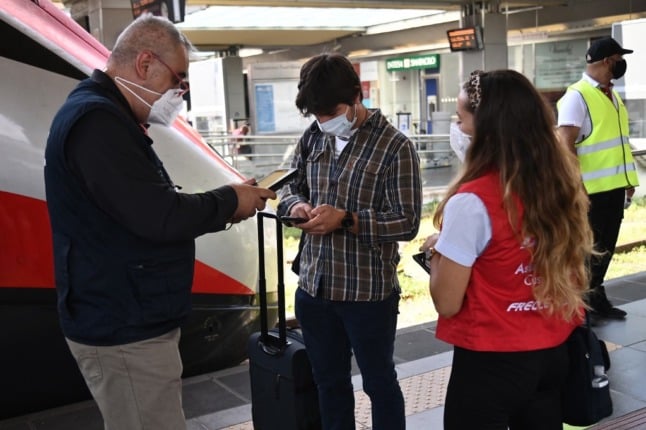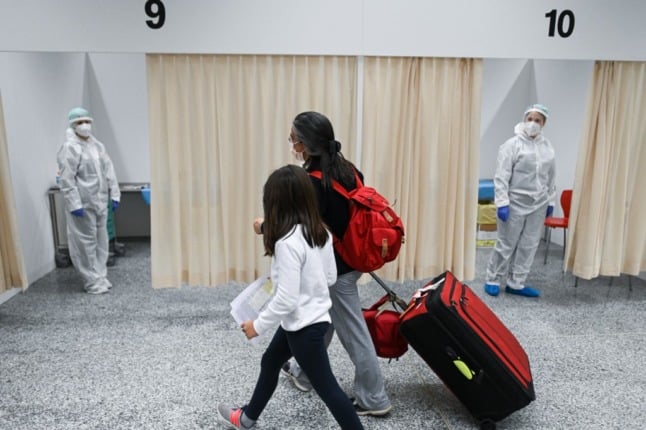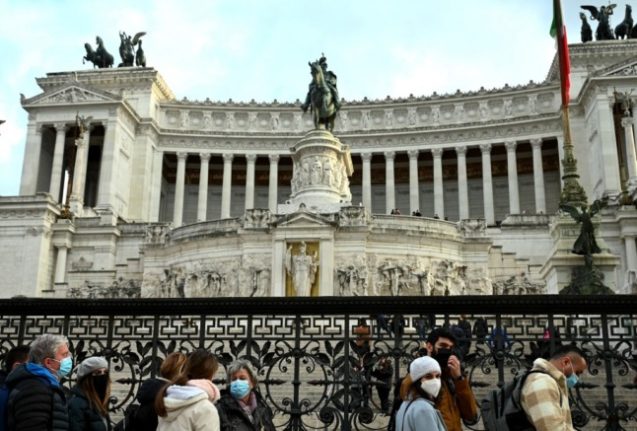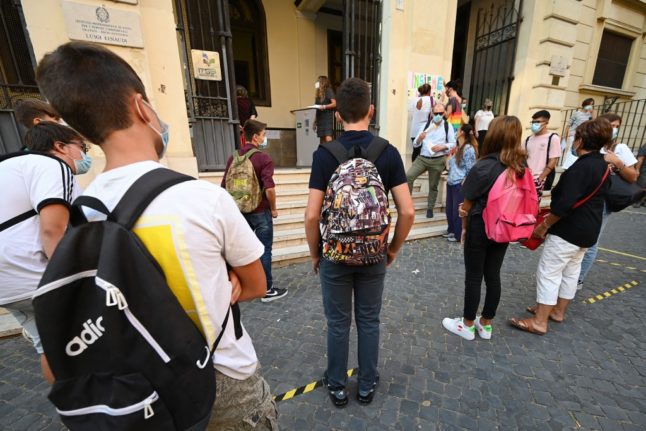Lots of Italy’s foreign residents booked their trips weeks or months ago, hoping they’d finally be able to visit home after long absences. Others might be planning a hotel stay in another part of the country to mark New Year’s Eve in style after limited celebrations last time.
But with coronavirus cases soaring around Europe, festive events being cancelled in Italian cities, and governments bringing in new travel restrictions at short notice, many people are now reconsidering plans.
Explained: How Italy’s rules on travel from EU countries have changed
Some eight million people in Italy have cancelled travel plans over Christmas and New Year due to the rise of the Omicron variant, according to the results of a survey published on Tuesday – though around half of the Italian population still intend to travel over the festive period, with 24 percent having already booked their trips.
If you’re undecided about whether your plans can or should go ahead in the coming weeks, here’s a look at the factors to consider.
What’s the Covid situation like in Italy right now?
Italy’s infection rate has taken a turn for the worse recently, with the country last Friday recording 28,632 new Covid cases in 24 hours – the highest number seen in over a year
Four more regions were declared ‘yellow’ zones on Monday as they exceeded thresholds for Covid hospitalisation and ICU occupancy rates.
As of Tuesday there are 987 Covid patients in intensive care in Italy, after an increase of 73 on Monday. The current number of people in ordinary hospital wards with Covid is 8,101, a rise of 375 on Monday.
Italian government ministers and health advisors remain cautious in their approach to handling the pandemic, and are generally urging people to keep gatherings small and travel within the country in order to slow the spread of infections.
EXPLAINED: How Italy’s new travel rules apply to children
“The spread of the Omicron variant obliges us to be extremely cautious in managing the coming months,”. Prime Minister Mario Draghi reiterated on Tuesday,
Franco Locatelli, head of the government’s CTS health advisory panel and president of the High Health Institute (ISS) said: “Although the Italian epidemiological situation remains the most favourable in Europe, we are certainly not free from the increased viral circulation that is being observed around the continent.”
“We must do everything possible to mitigate the risk of increasing the numbers of infected people, as well as those hospitalised or in intensive care,” he said in an interview with Italy’s Corriere della Sera newspaper on Monday.
Are people in Italy allowed to travel?
Yes. There are no rules that say you cannot travel within the country at the moment.
Last year, travel even within your own town was tightly restricted under ‘red’ zone rules over Christmas and New Year that effectively amounted to a lockdown.
Italy is relying less on the coloured zone system of restrictions this time around, and instead placing restrictions on those who are not vaccinated.
Under the country’s ‘green pass’ health certificate system, you will need to show that you are vaccinated, tested or recovered in order to use local public transport in Italy, such as buses and metro trains.
To take some forms of long-distance public transport, such as interregional trains and domestic flights, you need to prove you are vaccinated or recovered using Italy’s reinforced or ‘super’ green pass (or an equivalent document from your home country).
Q&A: How does Italy’s Covid ‘super green pass’ work?

If any Italian region is declared a higher-risk ‘orange’ zone in the coming weeks then travel to and from that area is likely yo become restricted. However, this doesn’t appear likely at the moment, with seven regions currently classed as moderate-risk ‘yellow’ zones and the rest of the country under minimal ‘white’ zone restrictions.
Holiday accommodation – like hotels and short-term rental apartments – remains open, but ‘green pass’ rules apply to all guests, including foreign visitors. Check the requirements with your accommodation provider before you go.
These rules are of course subject to change at short notice, and be aware that local and regional authorities can also bring in their own restrictions above and beyond those set by the national government.
There are of course strict regulations you have to be familiar with if travelling to Italy from abroad. These rules depend on the risk category of the country you’re coming from.
Read more about the recent update to the rules for arrivals in Italy from the EU or UK here, or find the current Italian travel rules for arrivals from any country here.
Should I still go ahead with travel and socialising?
At the moment Italy has no rules against holding parties or visiting other households – unlike last year – though health experts and government ministers are urging people to keep gatherings small and between vaccinated people only.
Health Minister Roberto Speranza on Monday recommended “maximum precaution and prudence” and said people should “avoid gatherings as much as possible during the Christmas holidays”.
But in many situations, the recommendations from the government on gatherings at Christmas remain just that: recommendations, not rules.
For example, there are currently no limits on the size of groups at tables in restaurants – though reinforced ‘green pass’ rules apply to indoor bars and restaurants, meaning you need to show proof of vaccination or recovery (not testing) to enter.
Ultimately the choice is up to you, and will depend on risk factors like if you are fully vaccinated, you and your family’s health, where you are going, and the number of people you plan to meet.
If you decide to get tested before meeting up with family members, you can get a rapid test at most pharmacies for around 20-30 euros (with prices varying by region). See more information about getting tested in Italy here.
Italy does have DIY home testing kits for sale in pharmacies and some supermarkets, though these are not as widely used as in countries such as Germany or the UK.
READ ALSO: ‘Fit to fly’: Are Covid lateral flow tests valid for travel to Italy?

When and how could the rules change?
After almost two years of the pandemic, we’re all well aware that travel and domestic restrictions can and do change at short notice
But how rapidly could things change, and is the Italian government likely to bring in rules that would curtail holiday plans?
In response to the increasing Covid case numbers throughout the country, the Italian government has called a meeting on Thursday to discuss potential new measures within the country.
There’s been no official word on what exactly could change, or when. But we do know that this is the first in a series of discussions needed before a new decree can be signed into law – and this usually takes several days, meaning it’s unlikely that anything will change before Christmas.
Such decrees usually also take at least several days to come into force once signed. However, in theory, under the ongoing state of emergency there’s nothing stopping the Italian government from announcing new measures effective immediately if deemed necessary.
While it’s not yet known if the government will introduce any major new restrictions under the upcoming decree, some cities have already imposed their own extra measures and have begun cancelling Christmas and New Year’s events.
One thing to watch out for is that local restrictions or partial lockdowns may be declared – but hotels will probably not be impacted
Italy updated its rules for international arrivals on December 16th, and this set of measures is set to be reviewed again on January 31st.
While it currently looks unlikely, it is possible that the health ministry could also declare new restrictions on certain countries before that date, as it did recently on eight countries in southern Africa when the Omicron variant was first detected.
See the latest news and updates from The Local on Italy’s current Covid-19 health measures and travel restrictions.
For further details about Italy’s current Covid-19 health measures please see the Italian Health Ministry’s website (available in English).



 Please whitelist us to continue reading.
Please whitelist us to continue reading.
i have now an account. does it mean i wont have to log in each time to read an article? this drives me CRRRAAAZY!
laure.moutet, Even though I have an account and don’t log out, I still have to log in from time to time, not sure why but it also drives me nuts.